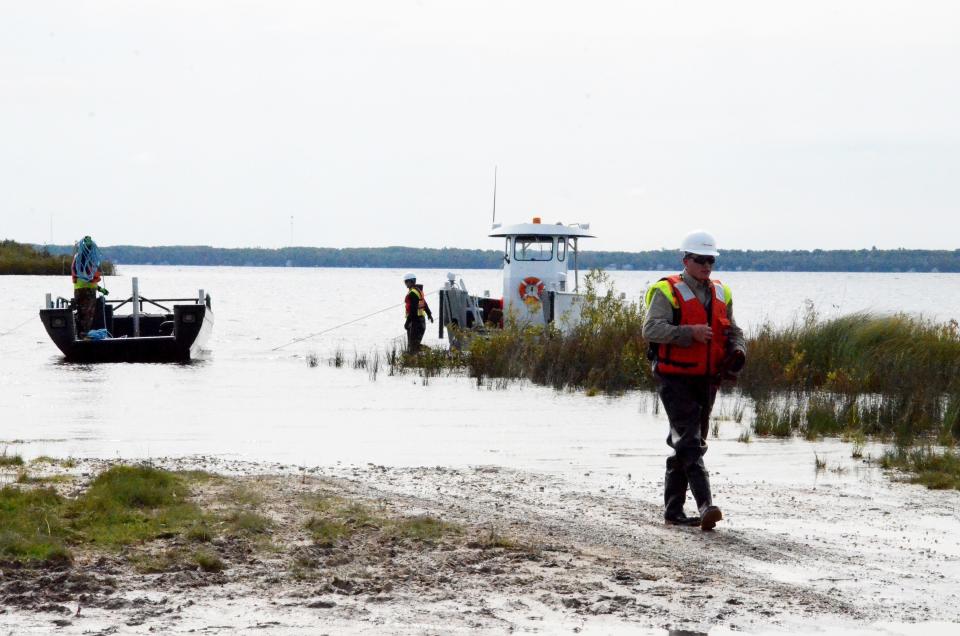Michigan, Wisconsin and Canadian tribes come together to fight Line 5
NORTHERN MICHIGAN — Native American tribes from Michigan, Wisconsin and Ontario have come together to call for an end to the Line 5 pipeline.
The Enbridge Line 5 crude oil pipeline, first constructed in 1953, stretches from Wisconsin through 645 miles of Michigan and ends in Sarnia, Ontario. Part of the pipeline travels underwater through the Straits of Mackinac.
In recent years, the pipeline's continued operation has become a source of controversy. Many tribal nations and communities claim that the pipeline goes through their traditional territories. The Straits area in particular is considered a place of significant cultural and historical importance to many native groups, including the Anishinaabe. According to tribal leaders, the pipeline poses a major and direct threat to the ecosystems along its path.
More: Enbridge rejects Michigan's demand to shut down oil pipeline
More: Enbridge sues Michigan over oil pipeline shutdown order
“The Straits of Mackinac are central to the Anishinaabe creation story, which makes this location sacred from both a cultural and historical perspective in the formation of the Anishinaabe people,” said Austin Lowes, chairperson of the Sault Ste. Marie Tribe of Chippewa Indians, in a statement. “Protecting the Straits is also a matter of the utmost environmental and economic importance — both to our people and the state of Michigan.”
Tribal leaders and other environmental groups have publicly opposed the pipeline for many years and have called for the pipeline to be shut down.
Supporters of the pipeline point out that it transports 540,000 barrels of light crude oil and natural gas liquids through Line 5 on a daily basis. Shutting it down could impact jobs, fuel transport and property taxes paid by Enbridge.
In an effort to address safety concerns, Enbridge has proposed an underwater tunnel to house the portion of Line 5 that runs under the Straits of Mackinac. However, the U.S. Army Corps of Engineers recently pushed the permitting timeline for the tunnel project back to spring 2025.
Critics of the tunnel project say no oil should be transported through the Straits at all, as a spill could have a devastating impact on more than 700 miles of Great Lakes shoreline.

More: New Canadian Consul General in Detroit talks EVs, Gordie Howe bridge and Line 5
More: As legal sparring continues, Army Corps pushes Line 5 permit timeline to 2025
“The rights of Indigenous people, of my people, are rights that should be respected by all sovereigns, both domestic and abroad,” said President Whitney Gravelle of the Bay Mills Indian Community in a statement. “Canada’s support of Line 5 is a disaster in the making for the entire Great Lakes region because an oil spill will poison our fish, harm our sacred sites, contaminate our drinking water — and ultimately destroy our Indigenous way of life.”
Previous attempts to shut down the pipeline have been stopped through various means, mostly the 1977 Transit Pipeline Treaty between Canada and the United States.
The latest attempt saw 51 tribal organizations from Wisconsin, Michigan and Ontario submit a report to the United Nations Human Rights Council. This report, dated April 4, claims that the Government of Canada is violating the human rights of Indigenous peoples through its continuous support for Line 5.
The report was submitted to be considered during Canada's upcoming Universal Periodic Review, conducted by the United Nations. As a United Nations member state, Canada is required to be evaluated for its human rights record on a regular basis.
Canada's Universal Periodic Review will take place this year on Nov. 6-17.
Subscribe: Get unlimited access to our content
The 51 different tribal organizations that signed the report include: The Anishinabek Nation, which represents 39 First Nations throughout the province of Ontario, Sault Ste. Marie Tribe of Chippewa Indians, Bad River Band of the Lake Superior Tribe of Chippewa Indians, Bay Mills Indian Community, Grand Traverse Band of Ottawa & Chippewa Indians, Hannahville Indian Community, Lac Vieux Desert Band of Lake Superior Chippewa Indians, Little River Band of Ottawa Indians, Little Traverse Bay Bands of Odawa Indians, Match-e-be-nash-she-wish Band of Pottawatomi Indians, Nottawaseppi Huron Band of Potawatomi, Saginaw Chippewa Indian Tribe and Red Cliff Band of Lake Superior Chippewa.
The full report as it was submitted the the United Nations can be found at earthrights.org.
— Contact Brendan Wiesner: BWiesner@Sooeveningnews.com
This article originally appeared on The Sault News: Great Lakes tribes send report to United Nations to fight Line 5

